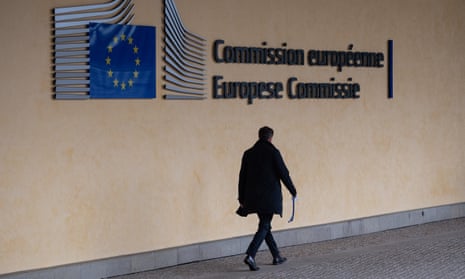The British government is quietly seeking access to the European Union’s pandemic warning system, despite early reluctance to cooperate on health after Brexit, the Guardian has learned.
The UK is seeking “something akin to membership” of the EU’s early warning and response system (EWRS), which has played a critical role in coordinating Europe’s response to the coronavirus, as well as to earlier pandemics such as bird flu. According to an EU source, this would be “pretty much the same” as membership of the system.
The government’s enthusiasm in the privacy of the negotiating room contrasts with noncommittal public statements. Detailed negotiating objectives published in February merely stated that the UK was “open to exploring cooperation between the UK and EU in other specific and narrowly defined areas where this is in the interest of both sides, for example on matters of health security”.
Health was not even mentioned in the government’s written statement to Parliament, aside from a reference to pharmaceuticals. Meanwhile, the Daily Telegraph reported on 1 March that No 10 had blocked the Department of Health’s request to be part of the EWRS.
A government spokesperson did not respond to a question about whether the UK was seeking a form of membership or participation in the EWRS, but referred back to the February negotiating objectives.
In private, the coronavirus, which had claimed at least 26,771 lives in the UK by Thursday, appears to have altered government thinking.
“There was not much appetite from the UK at the beginning,” said the EU source, referring to cooperation on health. “That’s been corrected. They are keen and they are keen to be seen to be keen. Both sides want close cooperation.”
However, the EU is not prepared to offer the UK full membership of the EWRS, an online platform set up in 1998 where public authorities share information about health emergencies.
Instead, EU officials propose to “plug the UK into” the system when a pandemic emerges, similar to arrangements for other non-EU countries.
Health security does not feature in the UK negotiating text sent in private to the EU’s chief negotiator, Michel Barnier, although EU officials have received a “non-paper” outlining government aims on health.
In another sign of rising British interest in European cooperation, the Guardian has established that the UK attended all five of the EU’s health security committee meetings on the coronavirus pandemic in April, a perfect attendance record, compared with a 70% British presence between 17 January and 30 March.
During the April meetings, officials discussed lockdown exit strategies and launching a joint procurement scheme on therapeutics in intensive care. No decision has been taken to launch this bulk-buying programme.
The Guardian first reported in March that the UK was not taking part in any of the EU’s four procurement schemes, missing bulk-buying efforts on personal protective equipment for medical workers, ventilators and testing kit – despite having attended relevant meetings.
Meanwhile, among NHS senior managers there is anxiety that Brexit talks risk “significant elements of health being forgotten about”, said Layla McCay, the international director of the NHS Confederation.
“NHS organisations have been stood up and stood down and stood up again for potentially a no-deal Brexit,” she said. “If a quite thorough future relationship for health matters is not on track come June, then the NHS is going to have to start to prepare for specific disruption next year as a result of Brexit, and it will have to do so while also facing both winter and coronavirus challenges. It will be a significant extra ask.”
British membership of the EWRS and broader EU health network “strengthen our ability to respond as effectively as possible” to health emergencies, McCay added.
The UK government spokesperson said: “The safety and security of our citizens is a top priority. The UK is ready to discuss how our citizens can be kept safe and benefit from continued international cooperation on health security following the end of the transition period, where it is in our mutual interest.
“Any such arrangements must align with the fundamental principles of respecting the UK’s political and economic independence, recognition of the UK and EU’s status as sovereign equals, and ensuring the UK has control over its own laws.”
